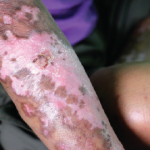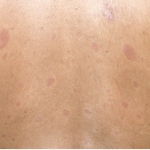
Plaques of thickened skin on the back of a patient with diffuse systemic sclerosis.
SPL / Science Source
A recent paper in Arthritis & Rheumatology opens up the possibility of a new research avenue to treat systemic sclerosis: dipeptidyl peptidase 4 (DPP4) inhibitors, a previously approved therapy for type 2 diabetes.1 Work in mouse models and on skin samples from systemic sclerosis patients suggests these drugs pose a promising area of future translational research.
TGF-β, DPP4 & Fibrosis in Systemic Sclerosis
Fibroblasts play a critical role in wound healing. When activated by local environmental conditions, the cells differentiate into myofibroblasts. These activated cells release profibrotic mediators, contract the tissue and provide the central source of extracellular matrix needed for wound repair.2
Alina Soare, MD, a rheumatologist in the Department of Medicine 3, Rheumatology and Immunology, University Hospital Erlangen, Germany, is first author of the recent paper on dipeptidyl peptidase 4 inhibitors. Dr. Soare points out that in normal wound healing, fibroblast activation stops as soon as the damage has been repaired. However, she notes, “in fibrotic diseases, tissue remodeling continues, with persistence of myofibroblasts in affected tissues.” For reasons that are not fully understood, fibroblasts sometimes maintain this activated state in an uncontrolled manner, causing excessive release of extracellular matrix and disrupting physiological tissue architecture.1,2
This fibrotic tissue remodeling plays a pathophysiological role in many diseases, including atherosclerosis, liver cirrhosis, renal fibrosis and many cancers.2 It is also one of the key characteristics of systemic sclerosis, where chronic activation of fibroblasts leads to the severe disability and morbidity associated with the condition.1
Broad evidence from different fibrotic diseases has demonstrated that persistent activation of transforming growth factor β (TGF-β) plays a key role in this process of fibrosis, promoting the activation of fibroblasts and their differentiation into their fibrotic myofibroblast state.1,3 Dr. Soare notes, “TGF-β plays a crucial role in systemic sclerosis-related fibrosis, as it stimulates the synthesis of extracellular matrix protein, decreases the release of collagen-degrading metalloproteinase and stimulates the production of protease inhibitors, which prevent the breakdown of extracellular matrix.”
The protein dipeptidyl peptidase 4 is a serine protease that can modulate intracellular signaling. Among other properties, it is thought to play a role in immune regulation.1 Previous work has demonstrated that fibroblasts that express DPP4 constitute a distinct fibroblast subset, a group that seems to play a critical role in fibrosis and wound repair.4 This and other factors led the team to explore the role of DPP4 in fibrosis in the context of systemic sclerosis.

